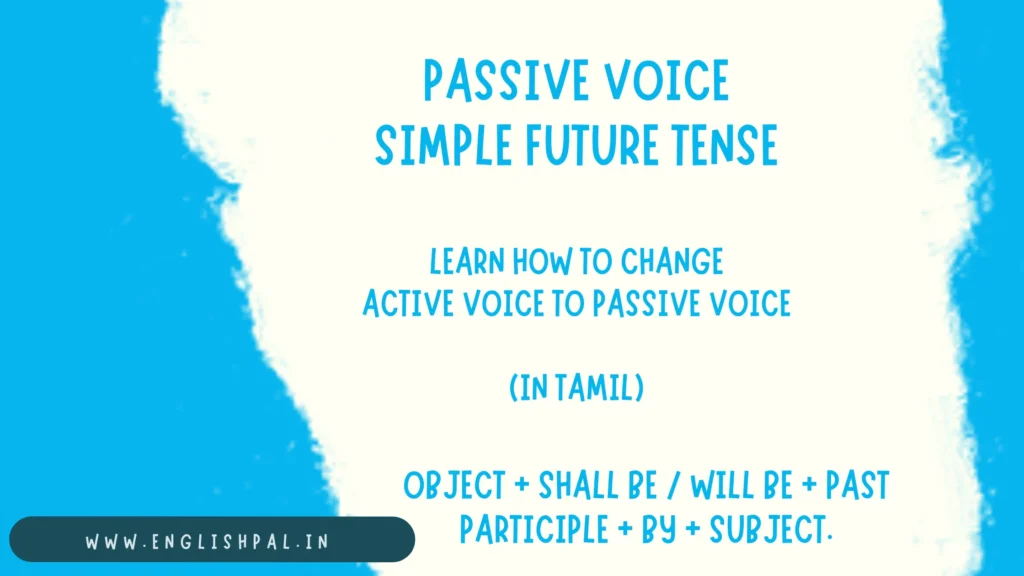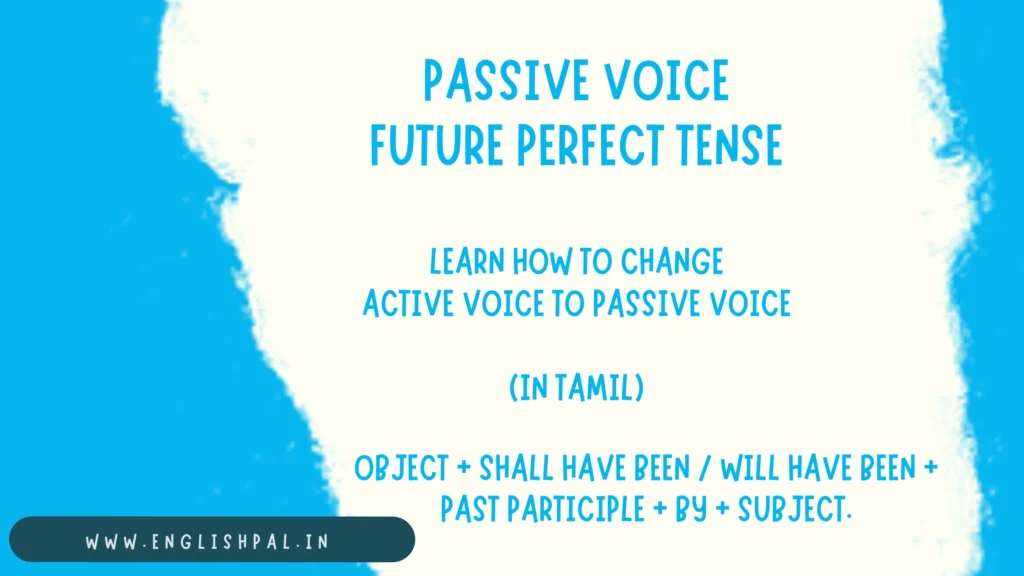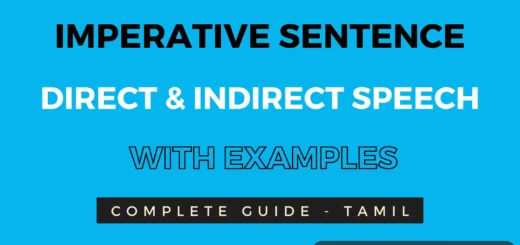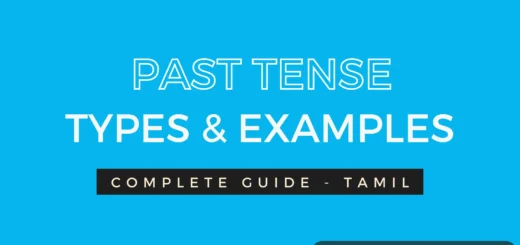Future tense passive voice rules with examples in Tamil
Future tense இல் உள்ள tense வகைகளை எவ்வாறு passive voice ஆக மாற்றுவது என்பதை விரிவாக இந்த பதிவில் காண்போம். நம்மால் இந்த future continuous மற்றும் future perfect continuous tense க்கு passive voice ஆக மாற்ற முடியாது. அதன் காரணம் என்ன என்பதையும் காண்போம்.
நாம் முதலாவதாக காண்பது இந்த Simple future tense passive voice ஆகும்.
Simple future tense passive voice

Passive voice formula for the simple future tense
| the Simple future tense | Passive voice form |
| the Simple future tense | Object + shall be / will be + past participle + by + subject. |
| the Simple future tense interrogative form | Shall / will + Object + be + past participle + by + subject ? |
| the Simple future tense negative form | Object + shall not be / will not be + past participle + by + subject. |
Active to passive voice ஆக மாற்ற நமக்கு noun, auxiliary verb, tenses போன்றவற்றை பற்றி தெளிவாக தெரிந்திருக்க வேண்டும்.
Auxiliary verb or helping verbs in Tamil
Simple future tense ஐ active voice இல் இருந்து passive voice ஆக மாற்றுவது எப்படி?
The simple future tense ஐ செயப்பாட்டு வினையாக மாற்ற கீழ்க்கண்ட முறையை பின்பற்றவும்.
Step 1
வாக்கியத்தின் இறுதியில் உள்ள செயப்படு பொருளை(object) வாக்கியத்தில் முதலாக கொண்டு வரவும். (Put the object first.)
Step 2
துணை வினைச்சொற்களை செயப்படுபொருளுக்கு ஏற்றாற்போல் shall, will இல் இருந்து shall be, will be க்கு மாற்றவும். (Change the auxiliary verb from shall, will to shall be, will be (based on the object).)
Step 3
present verb லிருந்து past participle verb ஆக மாற்றவும். (Change the present verb to a past participle verb.)
Step 4
வாக்கியத்தில் முன்னால் இருக்கும் subject ஐ இறுதிக்கு கொண்டு செல்லவும். (Move the subject to the sentence’s end.)
Step 5
subject க்கு முன்பு by சேர்க்கவும். (Use “by” before the subject.)
அவ்வளவு தான்
நாம் The simple future tense ஐ செயப்பாட்டு வினையாக மாற்றி விட்டோம்.
Examples of Active & passive voice rules for the simple future tense
1. I will watch a movie. – நான் ஒரு படத்தை பார்ப்பேன்.
A movie will be watched by me. – ஒரு படம் என்னால் பார்க்கப்படும்.
2. Will she play this match? – அவள் இந்த போட்டியில் விளையாடுவாளா?
Will this match be played by her? – இந்த போட்டியில் அவளால் விளையாட முடியுமா?
3. He will not take this class. – அவன் இந்த வகுப்பை எடுக்க மாட்டான்.
This class will not be taken by him. – இந்த வகுப்பானது அவனால் எடுக்கப்படாது.
4. He will drive the car. – அவன் கார் ஓட்டுவான்.
The car will be driven by him. – கார் அவனால் ஓட்டப்படும்.
5. She will make a toy. – அவள் ஒரு பொம்மையை செய்வாள்.
A toy will be made by her. – ஒரு பொம்மை அவளால் செய்யப்படும்.
6. We will see you. – நாங்கள் உங்களை பார்ப்போம்.
You will be seen by us. – நீங்கள் எங்களால் பார்க்கப்படுவீர்கள்.
7. They will catch you. – அவர்கள் உன்னை பிடிப்பார்கள்.
You will be caught by them. – நீ அவர்களால் பிடிக்கப்படுவாய்.
8. She will not take the medicine. – அவள் மருந்துக்களை எடுக்கவில்லை.
The medicine will not be taken by her. – மருந்துகள் அவளால் எடுக்கப்படவில்லை.
9. Dhaush will sing a song. – தனுஷ் பாட்டு பாடுவார்.
A song will be sung by Dhanush. – பாடல் தனுசால் பாடப்படும்.
10. Will you stop it? – அதை நிறுத்துகிறீர்களா?
Will it be stopped by you? – அது உங்களால் நிறுத்தப்படுமா?
11. It will take time. – அதற்கு நேரம் எடுக்கும்.
Time will be taken by it. – நேரம் அதற்கு எடுத்துக்கொள்ளப்படும்.
12. You will save money. – நீ பணத்தை சேமிப்பாய்.
Money will be saved by you. – பணம் உன்னால் சேமிக்கப்படும்.
13. She will eat a mango. – அவள் ஒரு மாம்பழம் சாப்பிடுவாள்.
A mango will be eaten by her. – மாம்பழமானது அவளால் சாப்பிடப்படும்.
14. I will call you later. – நான் உங்களை சிறிது நேரம் கழித்து அழைக்கிறேன்.
You will be called by me later. – நீங்கள் பின்னர் என்னால் அழைக்கப்படுவீர்கள்.
இப்போது நாம் Future perfect tense ஐ எப்படி passive voice ஆக மாற்றுவது என்பதை இப்போது காண்போம்.
Future perfect tense passive voice

Passive voice formula for the future perfect tense
| the future perfect tense | Active voice form |
| the future perfect tense | Object + shall have been / will have been + past participle + by + subject. |
| the future perfect tense interrogative form | Shall / will + Object + have + been + past participle + by + subject ? |
| the future perfect tense negative form | Object + shall have not been / will have not been + past participle + by + subject. |
The future perfect tense ஐ செய்வினையில் இருந்து செயப்பாட்டு வினையாக மாற்றுவது எப்படி?
The future perfect tense ஐ Active voice இல் இருந்து passive voice ஆக மாற்ற கீழ்கண்ட முறையை பின்பற்றவும்.
Step 1
வாக்கியத்தின் இறுதியில் உள்ள செயப்படு பொருளை(object) வாக்கியத்தில் முதலாக கொண்டு வரவும். (Put the object first.)
Step 2
துணை வினைச்சொல் will have, shall have உடன் object க்கு ஏற்றார்போல் அதனுடன் will have been, shall have been சேர்க்கவும். (Change the auxiliary verb from shall have, will have to shall have been, will have been (based on the object).)
Step 3
past participle verb ஐ அப்படியே வைக்கவும். மற்ற வகை tense ஆக இருந்தால் இப்படி வராது என்பதை நினைவில் கொள்ளவும். (Keep the past participle verb.)
Step 4
வாக்கியத்தில் முன்னால் இருக்கும் subject ஐ இறுதிக்கு கொண்டு செல்லவும். (Move the subject to the sentence’s end.)
Step 5
subject க்கு முன்பு by சேர்க்கவும். (Use “by” before the subject.)
அவ்வளவு தான். நாம் The future perfect tense ஐ செயப்பாட்டு வினையாக மாற்றி விட்டோம்.
Examples of Active & passive voice rules for the future perfect tense
1. She will have brought the book. – அவள் புத்தகம் கொண்டுவந்து இருப்பாள்.
The book will have been brought by her. – புத்தகம் அவளால் கொண்டுவரப்பட்டு இருக்கும்.
2. He will not have changed the TV wire. – அவர் TV வயரை மாற்றியிருக்க மாட்டார்.
The TV wire will not have been changed by him. – TV வயரானது அவரால் மாற்றப்பட்டிருக்காது.
3. Australia will have won the toss. – ஆஸ்ட்ரேலியா டாசை வென்று இருக்கும்.
The toss will have been won by Australia. – டாசானது ஆஸ்ட்ரேலியாவால் வெல்லப்பட்டு இருக்கும்.
4. She will have cooked it. – அவள் அதை சமைத்து இருப்பாள்.
It will have been cooked by her. – அது அவளால் சமைக்கப்பட்டு இருக்கும்.
5. Will she have cut the banana? – அவள் வாழைப்பழத்தை வெட்டி இருப்பாளா?
Will the banana have been cut by her? – வாழைப்பழம் அவளால் வெட்டப்பட்டு இருக்குமா?
6. It will have made a noise. – அது ஒலியை ஏற்படுத்தி இருக்கும்.
A noise will have been made by it. – ஒலியானது அதுவால் ஏற்படுத்தப்பட்டு இருக்கும்.
7. We will have won this test match. – இந்த போட்டியில் நாங்கள் வெற்றி பெற்றிருப்போம்.
This test match will have been won by us. – எங்களால் இந்த போட்டியில் வெற்றி பெற்றிருக்க முடியும்.
8. Will he have liked the books? – அவருக்கு புத்தகங்கள் பிடித்திருக்குமா?
Will the books have been liked by him? – புத்தகங்கள் அவருக்கு பிடிக்கப்பட்டு இருக்குமா?
9. They will have taken the notes. – அவர்கள் குறிப்புகள் எடுத்திருப்பார்கள்.
The notes have been taken by them. – குறிப்புகள் அவர்களால் எடுக்கப்பட்டு இருக்கும்.
10. The teacher will have taught the subject. – ஆசிரியர் பாடம் சொல்லிக்கொடுத்து இருப்பார்கள்.
The subject will have been taught by the teacher. – பாடம் ஆசிரியரால் சொல்லிக்கொடுக்கப்பட்டு இருக்கும்.
Passive voice formula for the future continuous tense in Tamil
The future continuous tense ஐ செய்வினையில் இருந்து செயப்பாட்டு வினையாக மாற்ற இயலாது. அவ்வாறு செயப்பாட்டு வினையாக மாற்றும் போது அது பொருளை தராது. நம்மால் வாக்கியத்தை பொருளுடன் அமைக்க இயலாது.
Passive voice formula for the future perfect continuous tense in Tamil
The future perfect continuous tense ஐ செய்வினையில் இருந்து செயப்பாட்டு வினையாக மாற்ற இயலாது.
இதற்கும் மேலே The future continuous tense க்கு கூறியது போல நமால் வாக்கியத்தை அமைக்க இயலாது. மேலும் வாக்கியமாக அமைத்தாலும் இது எவ்வித பொருளையும் தராது.
Present tense மற்றும் past tense வாக்கியங்களை எப்படி passive voice ஆக மாற்றுவது என்பதை step by step எடுத்துக்காட்டுகளுடன் விளக்கப்பட்டுள்ளது. அதனை காண,
Past tense passive voice rules with examples in Tamil
Present tense passive voice rules with examples in Tamil
Tense பற்றி அறிய
All 4 past tenses in Tamil with examples
Conclusion
இந்த பதிவில் future tense ஐ எப்படி passive voice ஆக மாற்றுவது என்பதனை ஒவ்வொரு படியாக எளிமையான எடுத்துக்காட்டுகளுடன் கண்டோம். மேலும் ஏன் இந்த future continuous மற்றும் future perfect continuous tense ஐ செயப்பாட்டு வினையாக மாற்ற முடியாது என்பதையும் கண்டோம். இது உங்களின் passive voice கற்றலில் ஒரு நல்ல புரிதலை தரும் என நம்புகிறேன். ஆங்கிலத்தில் மற்ற பிரிவுகளை பற்றி தெளிவாக காண நமது மற்ற பதிவுகளை படியுங்கள்.
இதில் ஏதேனும் சந்தேகங்கள் இருக்கிறதா? கவலை வேண்டாம். உங்கள் சந்தேகங்களை comment இல் தெரிவியுங்கள். நாங்கள் உங்கள் சந்தேகத்தை தீர்க்க ஆர்வமாக உள்ளோம்.
இந்த பதிவை பற்றிய உங்கள் கருத்துக்களை அறிய விரும்புகிறோம். உங்கள் கருத்துக்களை comments இல் பதிவு செய்யவும். நன்றி! வாழ்த்துகளும் அன்புகளும்!



